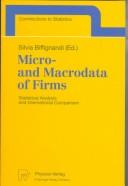| Listing 1 - 5 of 5 |
Sort by
|
Book
Year: 1983 Publisher: Milano Giuffrè
Abstract | Keywords | Export | Availability | Bookmark
 Loading...
Loading...Choose an application
- Reference Manager
- EndNote
- RefWorks (Direct export to RefWorks)

ISBN: 3790811432 Year: 1999 Publisher: Heidelberg Physica
Abstract | Keywords | Export | Availability | Bookmark
 Loading...
Loading...Choose an application
- Reference Manager
- EndNote
- RefWorks (Direct export to RefWorks)
Competition, International --- Industrial efficiency --- Industrial productivity --- Statistical methods --- Statistical methods --- Statistical methods
Book
ISBN: 9781118121757 9781118121726 9781118121740 9781118121733 9780470603567 0470603569 Year: 2012 Publisher: Hoboken Wiley
Abstract | Keywords | Export | Availability | Bookmark
 Loading...
Loading...Choose an application
- Reference Manager
- EndNote
- RefWorks (Direct export to RefWorks)
Methods in social research (general) --- Internet surveys --- Social sciences --- Social surveys --- Surveys --- #SBIB:303H32 --- #SBIB:303H4 --- Government surveys --- Mathematical geography --- Behavioral sciences --- Human sciences --- Sciences, Social --- Social science --- Social studies --- Civilization --- Research&delete& --- Methodology --- Statistics&delete& --- Waarneming en participerende waarneming, gecontroleerde observatie, groepsdiscussie (vragenlijsten, interviews, experimenten) --- Informatica in de sociale wetenschappen --- Research --- Statistics
Book
ISBN: 3031281772 3031281764 Year: 2023 Publisher: Cham : Springer Nature Switzerland : Imprint: Springer,
Abstract | Keywords | Export | Availability | Bookmark
 Loading...
Loading...Choose an application
- Reference Manager
- EndNote
- RefWorks (Direct export to RefWorks)
This SpringerBrief describes the development and use of a synthetic indicator to assess different degrees of sustainability adoption by economic sector and businesses size. To make this analysis a theoretical framework which involves variables common to alternative frameworks (specifically ESG, GRI and Istat) is proposed. The empirical analysis focuses on the environmental, social and economic variables of the Italian businesses. In this analysis, all three pillars of sustainability – economic, environmental, and social – are considered. The work begins with a review of business sustainability literature and a look into institutional frameworks for the development and measurement of the phenomena. Connections between businesses and the SDGs are examined and comparison of the classifications of sustainable activities defined by GRI and ESG international standards is used to define a framework to be adopted to analyse ISTAT Business Census. Selected indicator variables are aggregated with a synthetic indicator and the results are presented (this is a new proposal of a synthetic indicator useful for the type of data used and published by ISTAT – Italian National Statistical Institute), discussing pros and cons of using it. This study provides two important innovative contributions. The first one is about how to approach the theoretical framework of businesses sustainability at firms aggregated level. The basic idea to work on a set of variables common to different approaches is interesting from the interpretative point of view. The second one, is about the specific empirical analysis, i.e. the Italian businesses sustainability situation. The investigation based on this new theoretical classification/framework and the new proposed indicator provides some interesting substantive results. .
Sustainability. --- Business—Data processing. --- Statistics. --- Economic geography. --- Business Analytics. --- Economic Geography. --- Geography, Economic --- World economics --- Geography --- Commercial geography --- Statistical analysis --- Statistical data --- Statistical methods --- Statistical science --- Mathematics --- Econometrics --- Sustainability science --- Human ecology --- Social ecology
Multi
ISBN: 9783031281778 9783031281761 9783031281785 Year: 2023 Publisher: Cham Springer Nature Switzerland :Imprint: Springer
Abstract | Keywords | Export | Availability | Bookmark
 Loading...
Loading...Choose an application
- Reference Manager
- EndNote
- RefWorks (Direct export to RefWorks)
This SpringerBrief describes the development and use of a synthetic indicator to assess different degrees of sustainability adoption by economic sector and businesses size. To make this analysis a theoretical framework which involves variables common to alternative frameworks (specifically ESG, GRI and Istat) is proposed. The empirical analysis focuses on the environmental, social and economic variables of the Italian businesses. In this analysis, all three pillars of sustainability - economic, environmental, and social - are considered. The work begins with a review of business sustainability literature and a look into institutional frameworks for the development and measurement of the phenomena. Connections between businesses and the SDGs are examined and comparison of the classifications of sustainable activities defined by GRI and ESG international standards is used to define a framework to be adopted to analyse ISTAT Business Census. Selected indicator variables are aggregated with a synthetic indicator and the results are presented (this is a new proposal of a synthetic indicator useful for the type of data used and published by ISTAT - Italian National Statistical Institute), discussing pros and cons of using it. This study provides two important innovative contributions. The first one is about how to approach the theoretical framework of businesses sustainability at firms aggregated level. The basic idea to work on a set of variables common to different approaches is interesting from the interpretative point of view. The second one, is about the specific empirical analysis, i.e. the Italian businesses sustainability situation. The investigation based on this new theoretical classification/framework and the new proposed indicator provides some interesting substantive results. .
Statistical science --- Business management --- Economic geography --- economie --- statistiek --- organisatiecultuur --- geografie
| Listing 1 - 5 of 5 |
Sort by
|

 Search
Search Feedback
Feedback About UniCat
About UniCat  Help
Help News
News